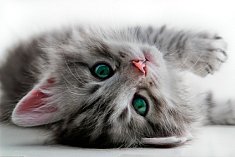|
Feline Herpes Virus: Causes, Symptoms And Treatments

Feline herpes virus goes by a variety of names, feline herpes, herpes-1, herpesvirus-1, FHV-1, rhinotracheitis, and feline viral rhinotracheitis (FVR). The herpes virus is the most common cause of upper respiratory infections in cats, followed by feline calicivirus. Upper respiratory infections affect the eyes, nose, mouth, throat, and sinus areas.
How Do Cats Get Herpes
Feline herpes virus is only contracted through direct contact with the virus. The virus is transmitted from infected cats through either saliva and/or secretions from the eyes and nose. As a result of the contagious nature of the virus, shelters and boarding are high-risk areas for the transmission of feline herpes. The virus can survive for roughly 24 hours away from living material and can be carried by any physical surface, such as clothing or blankets. Litter boxes and sources of water are also very common points of transmission between cats. If you have to place your cat in boarding make sure that you bring your cat’s blanket, toys, litter box and even food bowls from home and make sure to thoroughly wash and disinfected everything after bringing them home from boarding before allowing your cat to use the items.
Symptoms
There are a wide range of symptoms associated with feline herpes virus. Due to the fact that feline herpes virus affects the sinuses, infected cats often engage in feline snezzing. As a result of their blocked sinus passages, cats also often lose their strong sense of smell and because they smell their food before eating, they may lose interest in their meals. This lose of interest in their food can result in feline anorexia, which may further the weakening of their immune system because of the decrease in vital nutrients into the body. Following this reduction in appetite is the possibility of feline depression, both a result of their bodies being deprived of nutrients and an emotional response to sickness (which is exhibited by most mammals).
Also, because of their blocked sinuses, the sneezes may be heavy in discharge and their eyes may also discharge a mucous like fluid. Infected cats may also experience ulcers in their mouth and on their tongues. Cats with feline herpes virus are also prone to display high fevers during times of outbreak. It’s recommended for cat owners to establish a baseline temperature of their cat through regular use of rectal thermometers; this baseline can then be used in comparison to the cat’s temperature during times of suspected outbreak.
Treatment Options
Similar to the herpes virus found in humans, feline herpes virus can never be fully cured. Once a cat has contracted the virus, they will have it for the rest of their lifes. The most difficult period for an infected cat is the first outbreak, after which their immune system usually assist in reducing the amount of outbreaks. The contraction of feline herpes virus is especially threatening in kittens whose immune systems aren’t fully developed. Feline herpes is usually never directly fatal; it works by weakening the immune system and then paves the way for other infections, such as pneumonia, which may be fatal. For kittens and senior cats this increase of infections and the strength of the infection may be more than their bodies can handle. The recognition of any symptoms of feline herpes should always be treated with the utmost concern. Although there currently isn’t a cure for feline herpes virus, your vet may recommend amino acid supplements such as L-lysine, which has been used to suppress viral replication of the virus. Antibiotics can be used to treat secondary infections, since the more infections a cat has the more likely they are to experience another outbreak. Eye drops and saline drops may be prescribe to sooth itchy irritated eyes and reduce the spread of infection. If your cat has stopped eating and drinking, your vet may then recommended hospitalization so that your cat can receive the necessary fluids they need through IV. Keeping your cat’s nasal passageways and eyes clear of all discharge, by using cat friendly wipes or a clean warm cloth, is important because the build up of mucous encourages the replication of the herpes virus. A cat vaccine for the virus is available, however it does not provide 100 percent protection from the virus, but does help to reduce the severity of the impact of the virus and should be discussed with your veterinarian.
Similar Topics
Common Elderly Cat Health Problems - Discussing several different health problems that affect senior cats and treatment options. Cat Health Problems That Cat Owners Should Be Aware Of - Discussing several different common cat health problems.
Feline Eye Infection: Causes And Effective Treatments - Discussing different types of feline eye infections, causes and treatment options.
Feline Distemper: Causes, Symptoms,Treatments - Feline distemper, also known as feline panlekopenia (FPV), is an infectious disease that affects cats. Discussing the causes, symptoms and different treatment options.
Return From Feline Herpes Virus To Cat Health Home Page
|
Protect Your Pet Card
In Case Of An Emergency The Protect Your Pet Card Lets Emergency Services Know That You Have Pet/Pets Waiting For You At Home, Making Sure That Your Pets Are Cared For.
Get Your Card Today!
Win A Free $250 Petsmart Gift Card For Your Cat!
Must Be A US Resident
Click Here To Easily Enter For Your Chance To Win.

"There are few things in life more heartwarming than to be welcomed by a cat."






